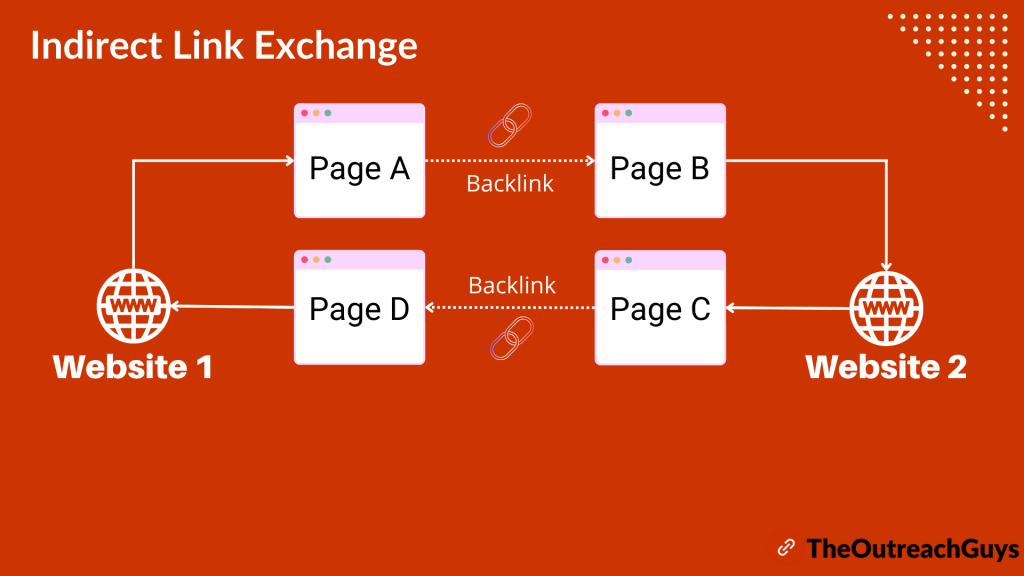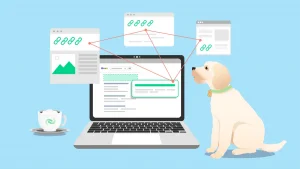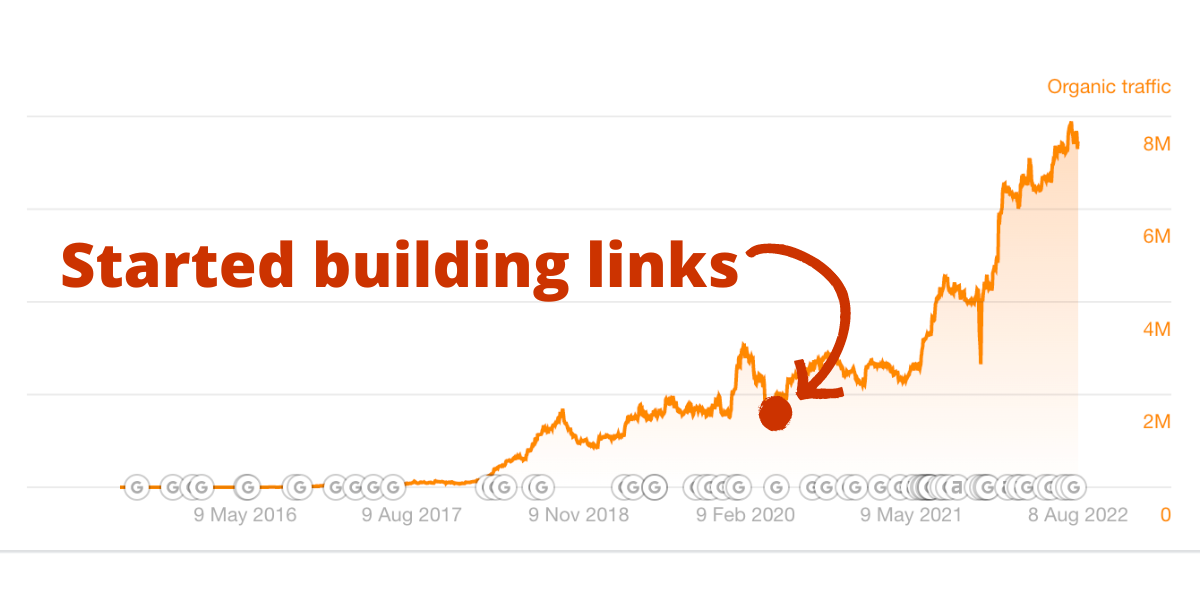Link exchange is one of the most popular link-building tactics out there and is a practice used by websites of all types and sizes to boost SEO.
The key here, though, is doing it the right way.
In this article, we’ll teach you how to do that and more!
What is Link Exchange?
Link exchange, also known as link swapping or reciprocal links, is the process of exchanging backlinks between two or more domains with the goal of increasing domain authority and ranking higher.
While Google discourages excessive link exchange by threatening a potential penalty, things aren’t that cut and dry.
When done safely and in moderation, link exchange can be a great way to boost your banklink profile and climb through the ranks.
What is Link Exchange Used For?
The idea behind link exchange is similar to “you scratch my back, I’ll scratch yours,” but for building backlinks.
Most search engines use links to help determine a site’s reputation, so having links from reputable sources pointing to your site helps increase your reputation and, thereby, your rankings.
That’s why many websites are open to link exchanges with the right partner.
If two websites agree to link to each other, i.e., swap links, it allows them both to mutually benefit by gaining backlinks. The higher the authority of the domains involved, the better they boost their rankings (i.e., reputation) in search results.
Is Link Exchange Good for SEO?
While no doubt a controversial topic in the link building community, ultimately, building quality backlinks between two domains is good for SEO.
If you ask Google, exchanged or reciprocal links are a type of link scheme, but it is still a common link building strategy widely used today, even among giant companies.

That’s because having common links between domains in a similar niche is a natural part of the web ecosystem.
Google can’t really tell if a link swap was done intentionally or not unless it’s done in an overly obvious manner, as we’ll see below.
How Has Link Exchange Evolved Over Time?
Exchanging links goes back to the early ages of the internet. Like many SEO tactics in the early days, link exchange was heavily exploited and yielded great results.
In the past, websites would often stuff their domains with irrelevant and reciprocal links to all corners of the internet, building an impressive backlink profile in the process.
However, long gone are the days of exploitable SEO strategies, with rampant link exchange being one of them.
But is link exchange out of commission? Not in the least, as we’ll find out.
Types of Link Exchanges Used Today
There are four different types of link exchange strategies generally used when link building.
1. Private Influencer Networks
A private influencer network (PIN) is a group of companies that partner up to swap links in order to boost their rankings and authority.
This allows businesses in a particular niche to leverage their domain authority and benefit from one another through a close-knit network of link exchanges.

In one popular study, it was found that top industry sites often promoted one another by regularly exchanging backlinks.
Although big brands use PINs to bolster their rankings, being part of one falls into a gray area as Google’s own guidelines on link exchange are rather vague.
It’s natural for authorities in a niche to link to each other, often in large amounts, making it hard to say whether there’s a PIN at play or not. However, it’s not impossible that Google’s algorithms catch on to the practice and take action in the future.
2. Reciprocal Links
Reciprocal linking is another term for link exchange. Although it can occur naturally between two sites in the same niche, it can also be agreed upon, i.e., “you link to me and I’ll link back to you.”
According to Ahrefs, 74% of sites with over 10K in traffic (from a random pool of 140K domains) were found to have reciprocal links.
While reciprocal links generally occur naturally, the timing, link exchange rate, and quality of links all play a role in whether Google will crack down on them. If you’re out for link exchange, there are better ways than reciprocal linking to choose from.
3. 3-Way Link Exchange
A 3-way link exchange, also known as an ABC link exchange, is a method used to hide any evidence of a direct link swap.

Instead of two sites exchanging links directly, an intermediary site is used.
Since this is a one-way link from one site to the next, it is practically impossible to be recognized as link swapping, making it perhaps the safest way to link exchange.
4. Indirect Link Exchange
Unlike a 3-way link exchange, an indirect link exchange involves only two domains rather than three, but instead of direct reciprocal linking between two pages, websites will link to one page and receive a reciprocal link from another.

Because this setup involves 4 pages rather than 2, an indirect link exchange is more discreet than reciprocal links between 2 pages, but not as hidden as an ABC link exchange.
5. Guest Post Swap
Guest post swapping involves two guest bloggers linking to each other through the articles they write on third-party sites.

For example, if you were a guest blogger publishing articles on other sites, in addition to including a backlink to your own site (the primary goal of guest posting), you would also include a backlink to your link exchange partner’s site, and vice versa.
This allows both guest bloggers to help each other land more backlinks from other sites.
The Pros & Cons of Using Link Exchange
Pros
1. It Positively Affects Your Brand
Exchanging relevant links between domains helps build trust among audiences and boosts rankings.
Much like how Google sees a high quality backlink, readers from an authority site will see a link to yours as a voucher for your brand or content.
2. It Helps with Google Rankings
The more quality backlinks a site has, the better the ‘trust’ signals to Google and the higher it is likely to rank. That’s why PINs, as we saw earlier, can be so effective.
3. It Can Improve Your SEO
Part of an SEO campaign is increasing a site’s trust status, relevance, and authority, which are all factors that quality backlinks majorly influence.
Cons
1. Link Exchange Can Go Wrong
Exchanging links properly and in moderation is relatively safe. However, if done in excess or with low-quality sites, then it’ll likely show up as a red flag to the search engine algorithms.
Another example is when an unusually high number of backlinks point to a brand new site, making it obvious that links are either being exchanged or bought.
2. Google Can Penalize You if You’re Not Careful
The definition of link exchange by Google is quite vague. That’s because unless a site goes overboard on link swapping, it’s hard to prove.
If Google does pick up on any foul play, there are two types of link exchange Google penalties.
One could be from the algorithm and the other could come from a manual review by a Google Search Advocate (a real employee).
In either case, the first sign of a penalty is a clear drop in organic traffic. If bad enough, a site can be removed, or de-indexed, from search results.
3. Link Exchange with the Wrong Partner Can Cost You Your Reputation
Part of what factors into a quality backlink is how trustworthy and relevant it is to the site it links to.
When link building, some companies can get overzealous and agree to exchange unnatural links with just about anybody, thinking the more backlinks the merrier.
But reciprocally linking to a bunch of untrustworthy, irrelevant sites will give a bad overall user experience and risk the site getting reported or flagged. Likewise, being featured on untrustworthy sites can also negatively affect your reputation.
Link Exchange Do’s
1. Finding the Right Link Exchange Partner
You don’t want to reach out to just anybody to swap links. Rather, look for sites that:
- Are well-established with a DR (domain rating) greater than 40
- Have healthy monthly traffic (typically above 5K organic visitors/month)
- Have less than a 1:2 ratio of inbound vs outbound links (more than that could mean it’s a link farm site)
- Are topically relevant to your site
- Are authorities in their niche with quality content
Once you’ve got a good list of potential link exchange partners, reach out with a link exchange offer or use our ready-made link exchange email template.
2. Where to find trustworthy partners
There are plenty of sources to explore when looking for link exchange opportunities. Online communities in your niche, doing keyword research to find relevant sites, or social media platforms are all places to look into.
Some platforms to consider when swapping links are:
- Slack groups: you can search for channels in a particular niche using a Slack bot.
- Facebook groups: there are plenty of groups for SEO, link building, blogging, and niche groups are all great places to link swap or swap guest posts.
- Discord: searching public servers can get you into some very niche communities.
- Reddit: along with SEO and link building subreddits, look for subreddits related to your niche and make connections.
- Keyword research: sites that rank for keywords in your niche can also be potential link exchange partners.
3. Exchanging Links Safely
Without a doubt, the best and safest way to link exchange is through an ABC link swap. If that’s not available, an indirect link exchange comes next in line.
These two link exchange strategies don’t leave any obvious reciprocal linking footprints between pages, making them a great way to safely build backlinks.
Things to Avoid When Exchanging Links
1. Exchanging Links with Untrustworthy or Irrelevant Partners
There are plenty of link exchange sites and services out there. Bulk link exchanges with shady domains or completely irrelevant websites will harm your search engine trust score.
Worse, it can get your site penalized and potentially de-indexed by search engines, essentially wiping out all organic traffic.
2. Direct Reciprocal Linking
The most obvious way of doing link exchange is when two domains link reciprocally at around the same time.
Link exchange is a natural part of the web ecosystem and generally happens spontaneously, so two domains swapping links at the same time are more likely to be picked up by Google’s ever-evolving AI.
3. Not Monitoring the Number and Quality of Link Exchange Partnerships
As mentioned above, most sites have some degree of link exchange going on, both in excess and in moderation.
When doing link exchange in large numbers, keeping track of your partnerships is important to know who you are linking to and, in return, who is linking to you and from where.
Similarly, it’s best to focus on quality over quantity when it comes to reciprocal linking because link swapping with low-quality domains is risky and not beneficial.
It’s hard to say exactly what % of overlap there should be when it comes to backlinks, but like all things in life, it’s best not to go overboard with link swapping.
FAQ on Link Exchange
1. Is Link Exchange Risky?
Yes, doing link exchange the wrong way is risky. Exchanging links in large amounts, with irrelevant or brand new sites, or with shady farm sites, are all ways to get flagged and penalized by search engines.
2. How to Determine Which Sites are Good for Link Exchange?
Sites that have a good DR rating above 40, are well-established, and have consistent organic traffic with an audience relevant to your niche are all good signs to look for in a link exchange partner.
3. Is a 3-way Link Exchange Better Than a Reciprocal Link?
Yes, a 3-way link exchange (aka ABC link exchange) is better because, unlike a reciprocal link exchange, it doesn’t leave behind any clear tracks of link swapping between domains.
Key Takeaways
When done properly, link exchange is a powerful way of building quality backlinks to your site, but it shouldn’t be the core of a link building strategy.
If you have a strong network in a certain space, there is an opportunity for all parties to leverage their status and benefit collectively through link exchange. It can be something agreed upon or happen naturally over the course of time.
And like most things in life, moderation is key. Google clearly states “excessive” link exchanging is against the rules. So focusing on quality vs. quantity while swapping links is a smart way to keep things in check and stay under the radar.







